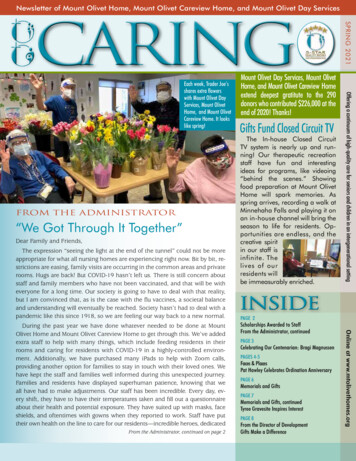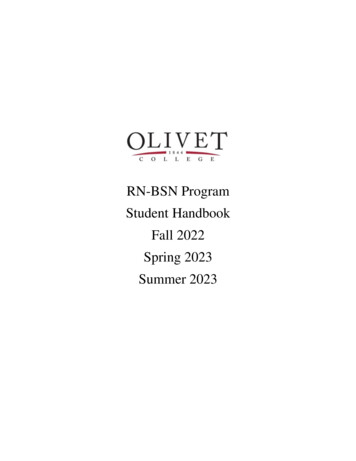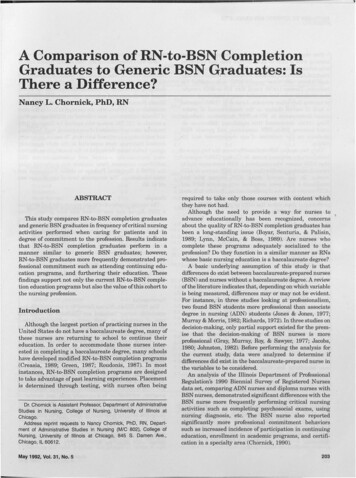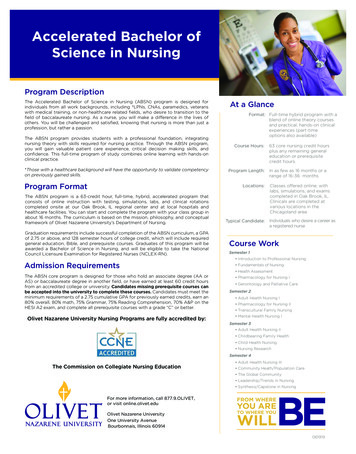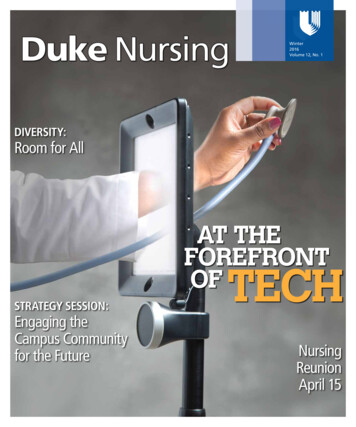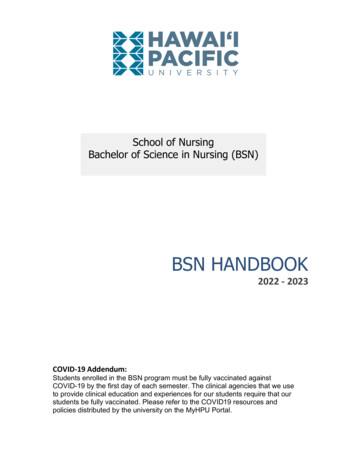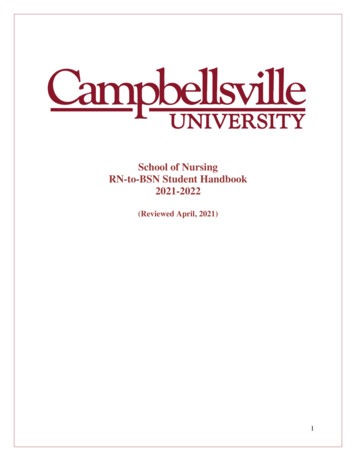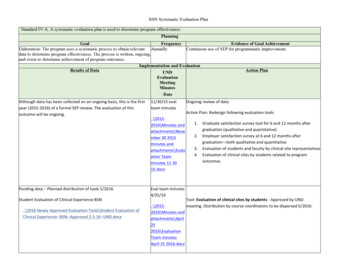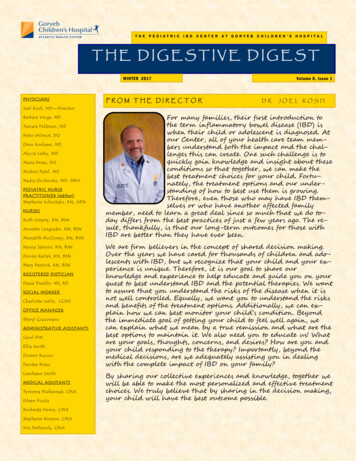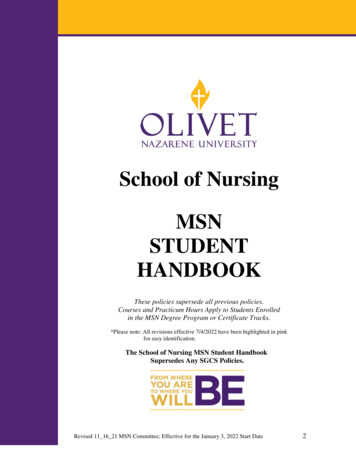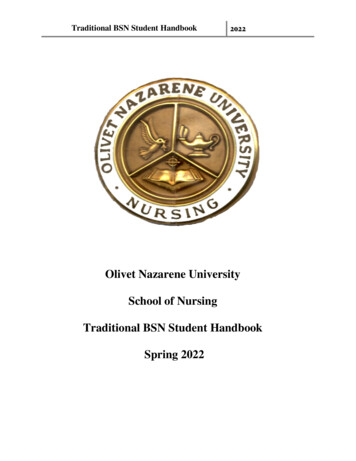
Transcription
Traditional BSN Student Handbook2022Olivet Nazarene UniversitySchool of NursingTraditional BSN Student HandbookSpring 2022
TABLE OF CONTENTSPageHANDBOOK AGREEMENTPHOTOGRAPHY PERMISSION AND USEPERMISSION FORM556OVERVIEWHistory of the Nursing ProgramAccreditation Status778NURSING PROGRAM FOUNDATIONMission StatementPhilosophyProgram OutcomesProgram Outcomes to Level OutcomesBSN Core Values99991011ONU BSN DEGREE REQUIREMENTS AND PROGRAM PLANBenchmarksOlivet Nazarene University School of Nursing Four-Year Plan121212BSN ADMISSIONS, PROGRESSION, AND RETENTION POLICIESAdmission to the Nursing Program (BSN)Requirements for Admission to the Nursing MajorHESI Admission Exam PolicyCriteria for Selection of Transfer StudentsProgression RequirementsReturn to the Nursing MajorAppeals/Grievance ProcedureGrade AppealsAcademic Policy AppealsGrievance PolicyNursing Department ProcedureRetentionAcademic Problem Solving Chain of Command1515151516161717181818181819ACADEMIC INTEGRITY AND PROFESSIONAL BEHAVIORStatement of Academic IntegrityEthics/PlagiarismCode of Interpersonal Professional AgreementProfessional BehaviorPreambleConfidentialityPrivacy and Confidentiality Under the Health Insurance Portabilityand Accountability Act of 1995 (HIPAA)1919191919202121TABLE OF CONTENTS (cont.)PageRevised 11-17-212
ACADEMIC SUPPORT SERVICESBenner LibraryLearning AssistanceCenter for Academic ExcellenceLearning Support Services/Disability Support ServicesGuidelines for Accommodating Students with Disability222222222223BSN ACADEMIC INFORMATION AND POLICIESOrientation Day PolicyRequired Books and ResourcesAttendance PolicyDidactic Class Attendance PolicyTardinessStudent Focus GroupGrade ScaleMath PolicyCourse ActivitiesUsing Turn it inLate Work PolicyExtra CreditExamination PolicyONU School of Nursing Computer Testing PolicyNotification of Exam GradesExam Make-Up ProcedureHESI Standardized Exam PolicyNursing Program Level and Course USSION BOARD AND FORUMConduct in Discussion Forums and Other Forms of CommunicationDiscussion Requirements and RubricModification of the SyllabusFamily Educational Rights and Privacy Act (FERPA)2828283030CLINICAL/VIRTUAL LEARNING CENTER (VLC) POLICIES AND EXPECTATIONSStatementClinical Placement/Assignments/Guidelines InformationObtaining a Capstone Experience31313132HEALTH POLICIES/COMPLIANCE/CLINICALPhysical Exam/Immunization Requirements for Nursing StudentsVaccination ComplianceImmunization Records Nursing StudentsCPR CertificationCriminal Background CheckDrug Screening PolicyIncident OccurrenceMedication Error/Near Miss323232333334343535TABLE OF CONTENTS (cont.)Revised 11-17-213
PageHealth InsuranceLiability InsuranceSafety Guidelines for Clinical SettingsStudent Expectations in the Clinical SettingGuidelines for Using Patient Information in the Clinical SettingUnsatisfactory Skills Within the Clinical SettingEvaluation of Student in the Clinical SettingClinical, Lab, and Simulation Absence PolicyVirtual Learning Center (VLC)SkillsSkills Check-Offs in Lab Prior to First Day of ClinicalVLC Skills Practice HoursStudent UniformUnsatisfactory Clinical Day3535353637373738383939394041SUPPLEMENTAL INFORMATIONTransportation and Motor VehicleInclement Weather PolicyGuidelines for Community ActivitiesGuidelines for Volunteer Service4242424242GRADUATION REQUIREMENTSRequirements for GraduationFees for State BoardsPost-Graduation Alumni SurveyLicensure RequirementsCriminal Background CheckProgram Evaluation43434343434444SHARED GOVERNANCE AND STUDENT ORGANIZATIONSOrganizations and ActivitiesThe Honor Society of Nursing, Sigma Theta Tau International, Kappa Sigma ChapterNursing Students in Action (NSA)Shalom Project4545454545CEREMONY AND AWARDSHonorsAwards and Scholarships464646APPENDIX AAPPENDIX BAPPENDIX CAPPENDIX DAPPENDIX E4749505155Revised 11-17-214
Olivet Nazarene UniversitySchool of NursingHandbook AgreementI, the undersigned, agree to the use of my course work and/or exam scores for the purpose of evaluation during myacademic tenure at Olivet Nazarene University. I understand the information will be aggregated data solely for thepurpose of enhancing the overall quality of the nursing program.I understand I am responsible for monitoring my ONU email, as this is how the Nursing Faculty and Administration willbe communicating with me. I also understand that nothing will be acknowledged or accepted by ONU unless it is throughthe Olivet email. The student must also use their Olivet email for all Evolve resources.In addition, I have reviewed the current Olivet Nazarene University Nursing Student Handbook. I accept responsibilityfor knowledge of the handbook contents and the standards and academic policies found herein. I give the universitypermission to use my social security number and birth date to fulfill clinical placement requirements and to theContinental Testing Company upon graduation to take the NCLEX examination.Print NameSignatureDate (month/day/year)SemesterPHOTOGRAPHY PERMISSION AND USEgrants Olivet Nazarene University permission to usephotographs of me in publications produced by the organization, web sites owned by the organization, or public relationsactivities conducted by the organization for the purpose of promoting Olivet Nazarene University.SignaturePermission given this day of , .After you have read the handbook, please email the School of Nursing administrative assistant and state, “I have readthe handbook and I also give permission for you to use my scores and grades as aggregate data to measure learningand program outcomes.” Please sign your name and date it.Revised 11-17-215
PERMISSION FORM*I give permission to my nursing advisor(s), nursing professors, clinical instructor(s),BSN program director, and director of nursing programs at ONU, to discuss my:Assignment gradesClinical PerformanceExam gradesStandardized Test ScoresCourse gradesOther academic measuresGrade Point AverageThose individuals who may contact members of the ONU School of Nursing Faculty include:Mother (name)Father (name)Guardian (name)Spouse (name)Other (name)RelationshipI understand that the individual(s) listed within this release will need to supply my student ID number to receive theinformation listed above. I also understand that I may revoke this permission by submitting a written request to the BSNprogram director.I understand that no information will be conveyed by email or US Postal Service. I request to be included in any phoneconversation or face-to-face discussions regarding my academic status.NoYes (I may be reached by phone at: )Student SignatureStudent ID #Date* The permission form only needs to be completed once for the program and will remain in effect until revoked by the student.Revised 11-17-216
History of the Nursing ProgramAs early as 1959, the possibility of initiating a baccalaureate nursing program was considered by OlivetNazarene (then) College administrative members who did not find it feasible to initiate a program at thattime. However, recognition of the need for nurses and the discontinuance of St. Mary’s hospital diplomaprogram in Kankakee prompted reconsideration early in 1966. At the May 1966 meeting of the OlivetBoard of Trustees, approval was given for the development of a baccalaureate degree program innursing.Assistance in planning the program was given by the Department Chair at Northern Illinois Universityand a nurse coordinator of the Illinois Department of Registration and Education. By September of 1966,the first chair, Faye Riley was employed to develop and lead the newly organized Department of Nursing.The first students to enroll in the nursing program started in the fall of 1967. The Dedication program onOctober 1968 indicates there were 34 students continuing in the course.Classes met in various buildings of the campus. The first Department of Nursing office was located inReed Hall of Science. Also, the lecture hall of Reed was used for classes requiring demonstrations. Roomsof Wellman Hall as well as in a college-owned building on Marseilles Street were used for teaching otherclasses. Later, the office of the Department of Nursing was located in Burke Hall. A generous gift from Mr.and Mrs. Gerett M. Wisner and a federal grant made it possible to construct a free-standing buildingdedicated for the nursing program.Groundbreaking for the Wisner Hall for Nursing Education was in February 1970 and was first used in1971. Wisner Hall provided four classrooms, a student lounge, a resource center with 24 carrels (eachequipped with tape and viewing machines), the Evelyn Witthoff - Geraldine Chappell auditorium(respectively named for a Physician – RN missionary team to India) capable of seating 150 students,office space for 20 faculty members, and a faculty lounge. Originally the Audio-Visual Department of thecollege occupied a large area in Wisner Hall. That space was made available to the nursing departmentwhen the audio-visual equipment was moved to Benner Library in 1976. Other departments and officeshave shared the building space through the years as well.The building remains a beautiful testament to the faithfulness and generosity of the Wisners. Wisner hasbeen updated with a Virtual Hospital, high fidelity simulation manikins, and 50 computer stations forstudy, standardized testing, and interactive learning.The Department of Nursing was designated a Division of Nursing in the spring of 1977 by the collegeadministration. The Division of Nursing received full approval from the National League for Nursing in1979 with the most recent approval in 1993. The nursing program made application to the Commissionfor Collegiate Nursing Education (CCNE) and received preliminary approval in 1997, and full approval in2001. In 1990, the Division of Nursing established a non-traditional track of the program of nursing forregistered nurses with an associate degree or a three-year diploma desiring the Bachelor of ScienceDegree in Nursing (RN-BSN). The first class began in January 1991.Kappa Sigma Chapter, Sigma Theta Tau, International Nursing Honor Society was established here onMay 12, 1984 through the hard work and dedication of the first Chapter President, Sue Davison, and theExecutive Board Members, VP-Margaret Frogge, Treasurer-Marvina Eckert, Secretary-Brenda Johnson,Revised 11-17-217
and Faculty Advisors-Leann Eaton and Amy Golyshko. The Nursing Students in Action joined the NationalStudent Nurses Association in 2008.In October 2000, a Master’s in Nursing Program was established to prepare nurses for the advancedpractice role; the first cohort of MSN students graduated in May 2003. In May 2005, the MSN program’sContinuous Improvement Progress Report was approved. In November 2006, the MSN program wasreviewed for accreditation by CCNE and accreditation awarded by AACN. In 2007 an expanded MSNoffering was launched to include tracks in Nursing Leader/Manager, Nursing Education, and EmergencyPreparedness-Disaster Response. Due to low enrollment in the Emergency Preparedness-DisasterResponse Track, it was dissolved and made way for a new track. In June 2011, the Family NursePractitioner, and May 2013 the Post-Graduate APRN Certificate tracks were launched. Olivet NazareneUniversity’s nursing programs are fully accredited by the Commission on Collegiate Nursing Education.With the 2006 restructuring of the University, the Division of Nursing became the Department of Nursingwithin the School of Professional Studies. However, a new restructuring was announced in May of 2014,and the Department of Nursing became the School of Nursing and Health Sciences, effective July 2014. InJuly 2015, with a new restructuring the School of Nursing and Health Sciences became a Department ofNursing in the School of Life and Health Sciences.In October, 2012 an accelerated BSN track was created. Coursework is online with on-ground lab andclinical. The first cohort finished in February 2014. The ABSN track is located in Oakbrook. This siteprovides multiple classrooms, two computer labs, and a fully equipped Virtual Learning Center.In Summer of 2016, a combined BSN-MSN track was created (RN-MSN/FNP). The first cohort started inJanuary 2017. The didactic program is online with practicum hours for each track.In April 2020, the Post-Master’s Nursing Education Certificate track (PMC-E) was approved and willbegin in January, 2021. On July 1, 2020, the Department of Nursing was designated as the School ofNursing under the direction of Associate Dean, Tiffany Greer, as a part of the College of ProfessionalStudies. In October 2020, the Post-Master’s Transformational Leadership (PMC-TL) Certificate track wasapproved and begins January, 2021.Olivet Nazarene University Nursing tracks are fully accredited by:Commission on Collegiate Nursing Education655 K Street, NWSuite 750Washington, DC 20001Phone: (202) 463-6930Fax: (202) 785-8320Revised 11-17-218
NURSING PROGRAM FOUNDATIONMissionThe mission of the School of Nursing is to provide Christian nursing education designed to prepare each graduate for alife of service to God and humanity. In this endeavor, students integrate faith and learning as they investigate conceptsinherent in personal, professional, and spiritual growth through life-long learning and leadership.PhilosophyThe philosophy of the Olivet Nazarene University School of Nursing encompasses spiritual, personal, and professionalconcepts that include the roles of leader, change agent, life-long learner, and service guided by ethical and moralstandards.Program Goals1. Transform students personally, professionally, and spiritually to serve God and humanity.2. Provide education utilizing interprofessional experiences, didactic and online learning, and evidencebased research to prepare students to successfully pass the NCLEX exam and become competent nurses.3. Foster a stimulating atmosphere that promotes intellectual curiosity to further develop critical thinkingthrough the exploration of cultural, ethical, moral, professional, and spiritual concepts.Program OutcomesGraduates are prepared to enter the profession of nursing as contributing members of the discipline, to promote, maintain,and restore the health of clients in a variety of settings. The outcomes of the traditional nursing major are to preparegraduates to:I.Serve God and humanity in diverse roles and settings with respect and compassion.Integrate Christian faith through ethical nursing practice.Articulate the value of professional development and evidence-based practice while preparing to be a lifelonglearner.Assimilate knowledge, skills, and attitudes from the liberal arts into nursing practice to competently care fordiverse populations.Demonstrate the development of leadership skills as a professional, accountable, collaborative change agentwithin a multifaceted health care environment.Utilize clinical judgment to prioritize safe nursing care.Communicate effectively through verbal and written modalities, using current and innovative technologies.II.III.IV.V.VI.VII.POII,VI,VIIA.I, II, B.Program Outcomes (PO) to Level OutcomesLevel 1Level 2Level 3Recognize andAnticipate andDifferentiate and applyimplement appropriate demonstrateappropriate nursing care,nursing care, through appropriate nursingthrough excellentexcellentcare, through excellent communication, thatcommunication, thatcommunication, that protects the client andprotects the client and protects the client and health care personnel in ahealth care personnel health care personnel variety of clinical settings.in diverse populations.Recognize andAnticipate andDifferentiate and applyRevised 11-17-21Level 4Evaluate, intervene, andpromote change in appropriatenursing care, throughexcellent communication, thatprotects the client and healthcare personnel in clients withcomplex needs.Evaluate, intervene, and9
VI,VIII, II, C.IV,VI,VIII, II, D.V,VI,VIII, II, E.IV,VII, II, F.IV,V,VI,VIII, II, G.IV,V,VII, II, H.IV,V,VI,VIIimplement basicprinciples of safety andinfection control forself and othersRecognize andimplement nursing carethat prevents anddetects health concernsin order to achieveoptimal healthdemonstrate safety andinfection controlpractices for self anddiverse populations.Anticipate anddemonstrate nursingcare that prevents anddetects healthconcerns across thelife span to achieveoptimal health indiverse populationsRecognize andAnticipate and provideimplement holistic care holistic care thatthat supports thesupports the cultural,cultural, emotional,emotional, mental,mental, social, andsocial, and spiritualspiritual well-being of well-being in diverseclients.populationsRecognize andAnticipate andimplement care anddemonstrate care andcomfort while assisting comfort whilewith performance ofassisting with ADLs inactivities of dailydiverse populations.living (ADLs)DetermineDetermineappropriateness of,appropriateness of,safely administer, and safely administer, andaccurately evaluate the accurately evaluate theclient response toclient response tomedications andmedications andparenteral therapies.parenteral therapies indiverse populations.principles of safety andinfection control for selfand others in a variety ofclinical settings.Differentiate and applynursing care that preventsand detects healthconcerns across the lifespan to achieve optimalhealth in a variety ofclinical settings.Determineappropriateness of,safely administer, andaccurately evaluate theclient response tomedications andparenteral therapies in avariety of clinicalsettings.Determine appropriateness of,safely administer, andaccurately evaluate the clientresponse to medications andparenteral therapies in clientswith complex needs.Recognize andimplement ways toreduce the likelihoodthat clients willdevelop complicationsor health problemsrelated to existingconditions, treatments,or procedures.Differentiate and applyways to reduce thelikelihood that clients willdevelop complications orhealth problems related toexisting conditions,treatments or proceduresin a variety of clinicalsettings.Evaluate, intervene, andpromote change to reduce thelikelihood that clients willdevelop complications orhealth problems related toexisting conditions, treatmentsor procedures in clients withcomplex needs.Differentiate and applymethods to manage andprovide care for clientswith acute, chronic, or lifethreatening healthconditions in a variety ofclinical settings.Evaluate, intervene, andpromote change to manageand provide care for clientswith acute, chronic, or lifethreatening health conditionsin clients with complex needs.Anticipate anddemonstrate ways toreduce the likelihoodthat clients willdevelop complicationsor health problemsrelated to existingconditions, treatments,or procedures indiverse populations.Recognize andAnticipate andimplement ways todemonstrate ways tomanage and providemanage and providecare for clients withcare for clients withacute or chronic health acute, chronic, or lifeconditions.threatening healthconditions in diverseRevised 11-17-21promote change regardingprinciples of safety andinfection control for self andothers with complex needs.Evaluate, intervene, andpromote change in nursingcare that prevents and detectshealth concerns across the lifespan to achieve optimal healthin clients with complex needs.Differentiate and applyholistic care that supportsthe cultural, emotional,mental, social, andspiritual well-being in avariety of clinical settings.Evaluate, intervene, andpromote change whileproviding holistic care thatsupports the cultutal,emotional, mental, social, andspiritual well-being of clientswith complex needs.Differentiate and applyEvaluate, intervene, andprinciples of care andpromote change by providingcomfort while assistingcare and comfort whilewith ADLs in a variety of assisting with ADLs in clientsclinical settings.with complex needs10
I, II, I.III,IV,V,VI,VIIRecognize andimplement ways todemonstrate corevalues and the use ofevidence-basedpractice in the care ofclients with acute orchronic physical healthconditions.populations.Anticipate anddemonstrate ways tointegrate core valuesand the use ofevidence-basedpractice in the care ofclients from diversepopulations.Differentiate and applymethods to integrate corevalues and the use ofevidence-based practice inthe care of clients withacute or chronic physicalhealth conditions.Evaluate, intervene, andpromote change to integratecore values and the use ofevidence-based practice in thecare of clients with complexneeds.OLIVET NAZARENE UNIVERSITYBSN CORE VALUESCore CompetenceEthical hangeLife-longLearningProfessionalismRevised 11-17-21DefinitionsA collaborative nurse works together interprofessionally within nursing oracross disciplines, fostering open communication, mutual respect, andshared decision-making to define and achieve a common purpose.A competent nurse combines knowledge, skills, attitudes, experience, andappropriate clinical judgment to perform safe care.Exchange of verbal and nonverbal information, ideas, and feelings in an effective,thorough, clear, concise, and timely manner.Cultural competence encompasses awareness and sensitivity with diverse individuals,which include all types of backgrounds, expectations, and experiences. Culturalawareness and sensitivity identify and addresses unconscious biases throughknowledge, skills, and openness to improve health, reduce disparities, and promotehealth equity.The principle of ethics describes what is expected in terms of right and/or wrongbehavior. Ethical nursing practice utilizes a personal philosophy grounded in theethical values of the profession and consistent with the beliefs and values of theChristian faith. However, there is a willingness to consider alternate views on ethicalissues and personal values from diverse populations.Nursing practice integrates current research and practice guidelines which arecritically appraised and scientifically proven for the delivery of quality healthcareand improved outcomes.A change agent identifies and responds to the need for change by using evidencebased practice to motivate, inspire, and promote innovative change within thecomplex healthcare system.The life-long learner engages in continuous self-reflection, curiosity and evaluationfor personal, professional, and spiritual growth.Being a professional means the student demonstrates personal and professionalaccountability, maintains a professional appearance, is trustworthy, has integrity,takes initiative, and uses problem-solving skills and ethical considerations to guidedecisions and actions. A professional treats others with dignity, kindness, respect, andcompassion.11
ServiceNurses contribute meaningful time and dedication in service to God and mankind tomeet the needs of diverse populations.ONU BSN DEGREE REQUIREMENTS & PROGRAM PLANTRADITIONAL RN - LEARNING OUTCOME EVIDENCE- BENCHMARKSCOURSEEVIDENCEMATCHED TO PROGRAMOUTCOMESNURS 207Spirituality PaperPO: I, II, VIICare PlanPO: IV, VINURS 335 Community Health & PopulationCommunity ProjectPO: III, V, VIIFocused CareNURS 456 Leadership/Trends in NursingEthical Dilemma PaperPO: I, II, V, VIINURS 449 Adult Health IIIHESI RN ExitPO: AllEnd of Program (EOP) survey withLearner outcomesSkills listNURS 478 Nursing CapstoneCare PlanPO: IV, VIRevised 11-17-2112
Olivet Nazarene UniversitySchool of NursingFour-Year PlanFRESHMANCreditsCHEM 101/103 Intro to Chemistry4BIOL 246 A & P 1*GradeFRESHMANCredits34BIOL 125 BiologyPre-req for BIOL 356 if taken at ONUBIOL 247 A & P II*ENGL 109 College Writing 13ENGL 210 College Writing II (APA)3THEO 110 Intro to Christianity3PSYC 200 Life Span Development31HIST 200 Western CivilizationGNST 110 Freshman Connections15SOPHOMORECredits4316GradeSOPHOMORE NURSING LEVEL 0CreditsSOCY 120 Sociology3BIOL 330 Pathophysiology3BIOL 211 Medical Terminology2Math 120 Statistics3COMM 105 Communication3FACS 126 Nutrition3LIT 105 Literature Appreciation(OR choose from other Humanities courseson back page)3ART 100 Fine Arts/MULTI 100 Fine Arts(OR choose from other Humanitiescourses on back page)BLIT 210 Christian ScripturesBIOL 356 Microbiology*Pre-Req: BIOL 125 and 4 hours ofChemistry (if taken at ONU)1.5/1.54JUNIOR NURSING LEVEL ICreditsNURS 206 Health Assessment **3(2/1)Pre-Req: NURS 202/Admit to Nrsg programCo-Req: NURS 180, 207, 227, 388NURS 202 Introduction to ProfessionalNursingPre-Req: BIOL 211, 246, 247, Passing scoreon HESI A2 exam, GPA 2.75.Pre/Co-Req: ENGL 210; CHEM 101/103,PSYC 200, SOCY 120, FACS 126, MATH120, BIOL 330, BIOL 356, COMM 10545 clinical hours6(4/2)32CreditsNURS 349 Adult Health Nursing I5(3/2)GradeNURS 342 Mental Health Nursing**4(3/1)NURS 445 Transcultural Nursing3NURS 466 Nursing Research3Pre-Req: NURS 180, 206, 207, 227, 388Co-Req: NURS 280, 342, 349, 4451Pre-Req: NURS 202/ Admit to Nrsg programCo-Req: NURS 206, 207, 227, 388CMIN 310 Christian LivingJUNIOR NURSING LEVEL IIPre-Req: NURS 180, 206, 207, 227, 388Co-Req: NURS 280, 342, 349, 466Pre-Req: NURS 202/ Admit to Nrsg programCo-Req: NURS 180, 206, 207, 227NURS 180 Nursing Seminar 115Pre-Req: NURS 180, 206, 207, 227, 388Co-Req: NURS 280, 349, 445, 466Pre-Req: NURS 202/ Admit to Nrsg programCo-Req: NURS 180, 206, 207, 388NURS 388 Gerontology and PalliativeCareGrade3(2/1)Pre-Req: NURS 180, 206, 207, 227, 388Co-Req: NURS 280, 342, 445, 466Pre-Req: NURS 202/ Admit to Nrsg programCo-Req: NURS 180, 206, 227, 388NURS 227 - Introduction to PharmacologyGrade318NURS 207 Fundamentals of Nursing **GradeNURS 280 Nursing Seminar 21Pre-Req: NURS 180, 206, 207, 227, 388Co-Req: NURS 342, 349, 445, 4663Elective NURS 470 Self Care(1)Pre-Req: NURS 180, 206, 207, 227, 388Co-Req: NURS 466135 clinical hours18135 clinical hours16(Grad check recommended)Revised 11-17-2113
SENIOR NURSING LEVEL IIICreditsNURS 439 Adult Health Nursing II**Grade5(3/2)Pre-Req: NURS 280, 342, 349, 445, 466Co-Req: NURS 380, 378, 415SENIOR NURSING LEVEL IVCreditsNURS 449 Adult Health Nursing III**Grade3Pre-Req: NURS 378, 380, 415, 439Co-Req: NURS 335, 456, 478, 480NURS 378 Childbearing Family HealthNursing**4(3/1)Pre-Req: NURS 280, 342, 349, 445, 466Co-Req: NURS 380, 415, 439NURS 335 Community Health andPopulation Focused Care**3(2/1)Pre-Req: NURS 378, 380, 415, 439Co-Req: NURS 456, 449, 478, 480NURS 415 Child Health Nursing**4(3/1)Pre-Req: NURS 280, 342, 349, 445, 466Co-Req: NURS 378, 380, 439NURS 456 Leadership and Trends inNursing**3Pre-Req: NURS 378, 380, 415, 439Co-Req: NURS 335, 449, 478, 480NURS 380 Nursing Seminar 31Pre-Req: NURS 280, 342, 349, 445, 466Co-Req: NURS 378, 415, 439NURS 478 Nursing Capstone4(0/4)Pre-Req: NURS 378, 380, 415, 439Co- Req: NURS 335, 449, 456, 480NURS 480 Nursing Seminar 41Pre-Req: NURS 378, 380, 415, 439Co-Req: NURS 335, 449, 456, 478180 clinical hours141 credit hour of clinical 45 clock hours(*) Only offered once a year225 clinical hours14Total clinical hours 720 clock hours(**) Courses with a HESI assessment associated with themBOLD support courses* Students must maintain a 2.75 GPA and no less than a grade of C in all support courses (bolded on schedule) to remain in good standing inthe nursing program.Approved Humanities Courses (may look different for Transfer Students)Select ONE 3 credit hour class from TWO different areas (Fine Arts, Literature, Philosophy, and Modern Language)Fine Arts:Art 100/Mult 100Literature:LIT 105 Literature AppreciationLIT 242 The Short StoryLIT 244 The NovelLIT 246 PoetryLIT 248 DramaLIT 340 Classical LiteraturePhilosophyPHIL 201 Introduction to Philosophy***This 4-year plan is tentative and we reserve the right to modify it.***Revised 11-17-2114
BSN ADMISSION, PROGRESSION, AND RETENTION POLICIESThe nursing curriculum builds on a broad liberal arts foundation and is supported by behavioral and life science courses.Nursing students progress from wellness emphasis to life-threatening situations and address individuals, families, andcommunities as clients. Admission to nursing can be accomplished in either the fall or the spring semester.ADMISSION TO THE NURSING PROGRAM (BSN)Students will not be admitted into the nursing program if any of the following courses are taken more than twice at anyuniversity: Chemistry, Anatomy and Physiology I and II, Microbiology, Pathophysiology, and Medical Terminology.Students may not retake more than two science courses.All applicants must first apply to the university. As a freshman or sophomore declaring nursing as your major, you will beconsidered a pre-nursing student. Students must pass the HESI A2 prior to entering NURS 202. During NURS 202,Introduction to Professional Nursing, you will be given information about the application process for entering the nursingprogram in the junior year. Students with a 2.75 GPA and completed freshman and sophomore general education courseswill be notified of the steps to apply to the nursing program. Applicants are notified in writing of their status at theconclusion of NURS 202 course. Additional information and evaluative data may be requested by the School of Nursingto more fully evaluate the applicants’ credentials.Students enrolled in the nursing program may not transfer nursing courses into their transcript. The Admission,Progression, and Retention Policies regarding the failure of nursing courses apply to nursing courses taken in othernursing programs.Requirements for Admission to the Nursing Major A cumulative 2.75 GPA before admission to NURS 202 Successful completion of NURS 202 and supporting courses through Level 0 Successful completion of the HESI A2 exam Successful completion with a grade of C or higher in all nursing and support courses All required academic prerequisites have been completed Cleared federal criminal background check Negative drug screen Physical/Health Examination Record (no older t
Olivet Nazarene University's nursing programs are fully accredited by the Commission on Collegiate Nursing Education. With the 2006 restructuring of the University, the Division of Nursing became the Department of Nursing within the School of Professional Studies. However, a new restructuring was announced in May of 2014,
